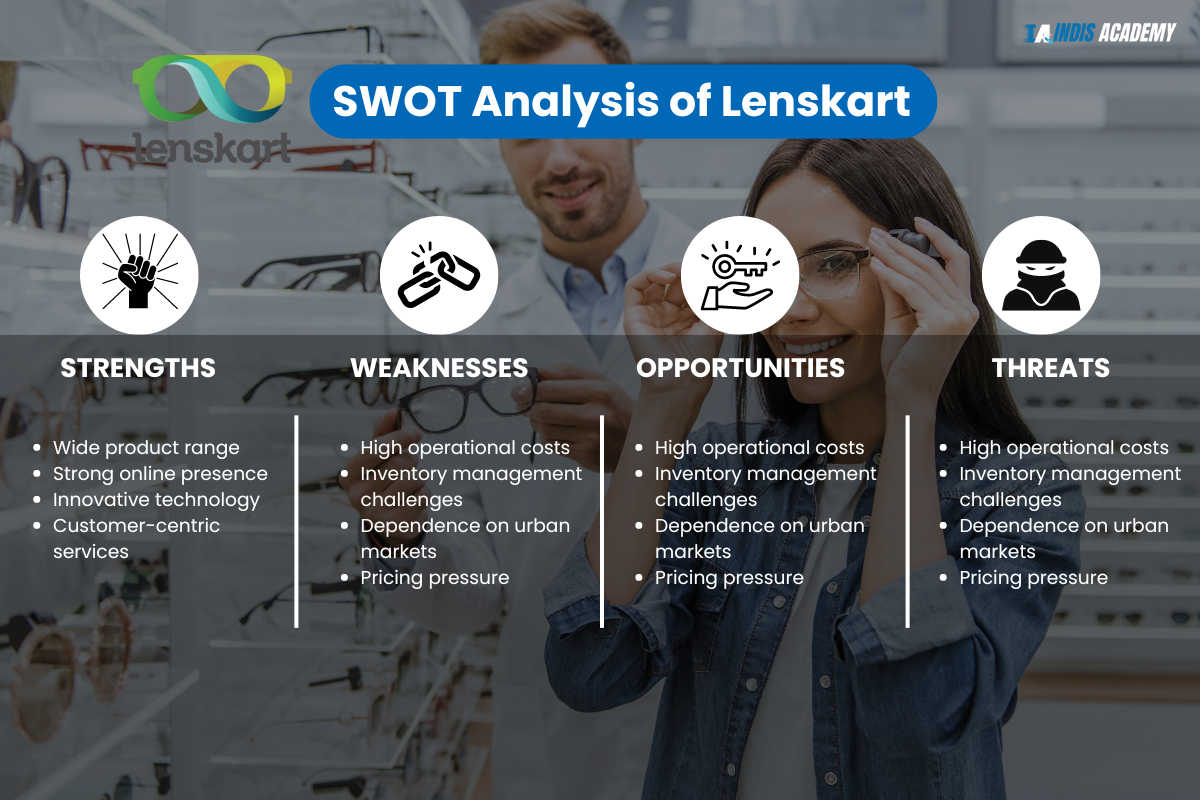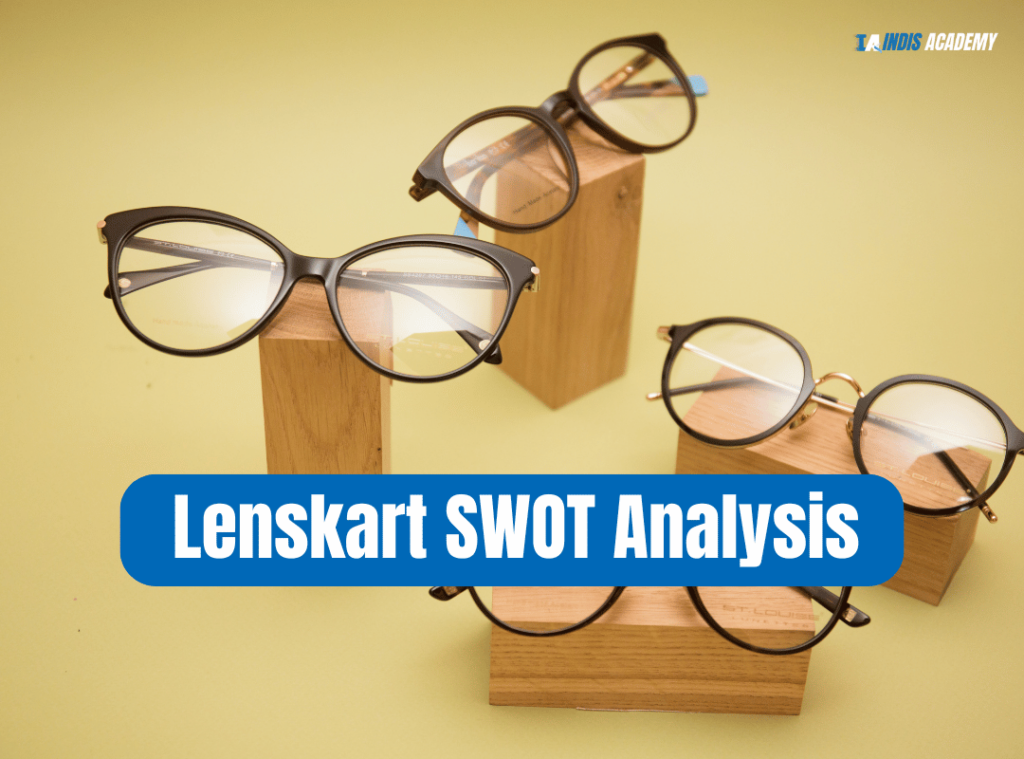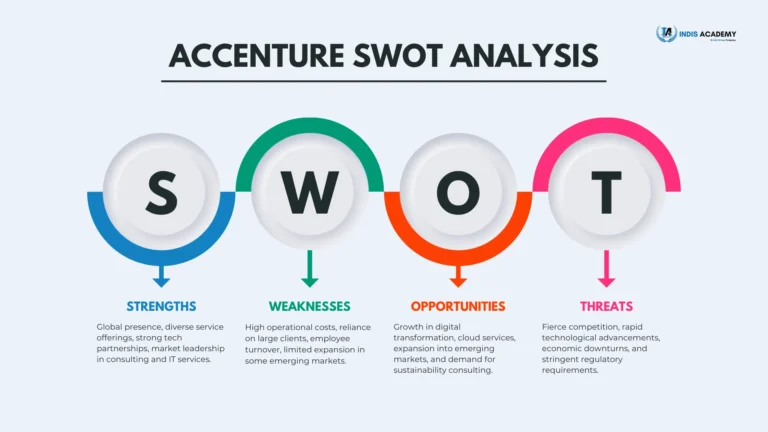Hey there! Today, we’re diving into the world of Lenskart, one of India’s leading eyewear brands, through the lens of a SWOT analysis. But before we jump into the details, let’s quickly break down what a SWOT analysis is and why it’s so important.
A SWOT analysis is like a business check-up. It stands for Strengths, Weaknesses, Opportunities, and Threats. By looking at these four areas, we can get a clear picture of where a company stands, what it does well, where it might need some help, what chances it has to grow, and what risks it might face.
Now, why is this important for Lenskart? Well, understanding these factors can help us see how Lenskart has become a game-changer in the eyewear industry. From its innovative business model to its customer-friendly approach, there’s a lot to explore. We’ll look at what makes Lenskart shine, where it could improve, the exciting opportunities it can seize, and the challenges it needs to watch out for. So, let’s get started and uncover the strategic position of Lenskart through this insightful SWOT analysis!
In-Depth Lenskart SWOT Analysis
Lenskart is one of India’s leading eyewear retailers, founded in 2010 by Peyush Bansal. The company began with a clear mission: to make high-quality eyewear accessible and affordable for everyone. Over the years, Lenskart has transformed the eyewear market with its unique business model that blends online and offline shopping experiences. Offering a wide range of eyeglasses, sunglasses, and contact lenses, Lenskart caters to a diverse customer base. Known for its stylish designs, affordable prices, and exceptional customer service, Lenskart has become a significant player in the industry. Whether you’re seeking the latest trends or timeless classics, Lenskart has something for everyone. Let’s explore some key details about the company.
Key Details About Lenskart
| Detail | Information |
|---|---|
| Founding Date | 2010 |
| Founder | Peyush Bansal |
| Company Size | 4,000+ employees |
| Country | India |
| Headquarters | Faridabad, Haryana |
| Industry | Eyewear Retail |
Lenskart Products & Competitors
Lenskart offers a diverse range of eyewear products designed to meet the needs of various customers. Their main product lineup includes eyeglasses, sunglasses, and contact lenses, each crafted with a focus on quality, style, and affordability. Lenskart’s eyeglasses come in an array of designs, from sleek and modern to classic and timeless, ensuring there’s something for everyone. They also offer Blue Cut lenses to protect against harmful blue light, perfect for those who spend long hours in front of screens.
Sunglasses are another key product, available in numerous styles such as aviators, wayfarers, and cat-eye frames. These not only provide UV protection but also add a touch of flair to any outfit. For contact lens users, Lenskart provides daily, bi-weekly, and monthly disposable lenses, including colored lenses for those looking to change their eye color.
Now, let’s talk about Lenskart’s competitors. In the Indian market, Titan Eyeplus is a major player, offering a similar range of eyewear products with a strong retail presence. Another competitor is Specsmakers, known for its affordable and trendy eyewear options. International brands like Ray-Ban and Oakley also compete with Lenskart, especially in the premium segment. Additionally, online platforms like Coolwinks and John Jacobs provide stiff competition, leveraging their digital presence to attract customers.
Despite the competition, Lenskart stands out with its innovative approach, blending online convenience with offline touchpoints through its numerous stores, ensuring customers get the best of both worlds. This combination of a wide product range and strategic market positioning makes Lenskart a dominant force in the eyewear industry.
Competitor Overview
| Competitor | Description |
|---|---|
| Titan Eyeplus | A major Indian eyewear retailer offering a broad range of eyeglasses, sunglasses, and contact lenses. Known for its strong retail presence and trusted brand image. |
| Specsmakers | An affordable eyewear brand in India, popular for trendy and budget-friendly options. Focuses on providing value-for-money products. |
| Ray-Ban | An international premium eyewear brand renowned for its high-quality and iconic designs, particularly in the sunglasses segment. |
| Oakley | A global eyewear brand known for its high-performance and stylish products, especially favored by athletes and outdoor enthusiasts. |
| Coolwinks | An online platform offering a wide variety of eyewear products, leveraging its digital presence to attract a tech-savvy customer base. |
| John Jacobs | A stylish and premium eyewear brand under the umbrella of Lenskart, known for its fashionable designs and high-quality materials. |
This table provides a quick overview of Lenskart’s main competitors, helping to understand the competitive landscape in which Lenskart operates.
Lenskart SWOT Analysis
A SWOT analysis of Lenskart provides a clear snapshot of the company’s strategic position by examining its Strengths, Weaknesses, Opportunities, and Threats. This analysis helps identify what Lenskart excels at, areas where it can improve, potential growth opportunities, and external challenges it might face. Understanding these factors is crucial for Lenskart to maintain its market leadership, innovate, and navigate the competitive eyewear industry effectively. It’s like giving Lenskart a strategic health check-up to ensure continued success and growth.

Strengths
- Innovative Business Model: Lenskart seamlessly blends online and offline shopping experiences. This hybrid model allows customers to browse and order eyewear online while also offering the convenience of trying out products at physical stores, combining the best of both worlds.
- Wide Product Range: Lenskart offers a diverse selection of eyeglasses, sunglasses, and contact lenses. From budget-friendly options to premium styles, their extensive range caters to various customer preferences and needs, ensuring broad market appeal.
- Advanced Technology: Utilizing AI-driven tools like 3D Try-On and home eye check-up services, Lenskart enhances the shopping experience. These technological innovations not only improve customer satisfaction but also set Lenskart apart from traditional eyewear retailers.
- Strong Brand Presence: Lenskart has built a strong brand reputation through effective marketing and excellent customer service. Their recognizable brand and trustworthiness make them a go-to choice for eyewear in India.
- Customer-Centric Approach: With features like home trials, easy returns, and frequent discounts, Lenskart puts the customer first. This customer-centric approach has garnered a loyal customer base and positive word-of-mouth referrals.
Weaknesses
- High Operational Costs: Maintaining both online and offline operations can lead to significant costs. The expenses associated with running physical stores, logistics, and technology infrastructure can impact profitability.
- Dependence on Indian Market: While Lenskart is expanding globally, a major portion of its revenue still comes from India. This dependency on a single market can be risky if economic conditions or consumer preferences change.
- Inventory Management: Managing a vast inventory to cater to diverse customer needs can be challenging. Overstocks or stockouts can affect sales and customer satisfaction, highlighting a need for efficient inventory control.
- Competition Pressure: The eyewear market is highly competitive, with both established players and new entrants. Intense competition can lead to pricing pressures and the need for continuous innovation to stay ahead.
- Quality Control: Ensuring consistent product quality across a large and varied inventory can be difficult. Any lapses in quality can harm the brand’s reputation and lead to customer dissatisfaction.
Opportunities
- Global Expansion: Expanding into international markets offers Lenskart a significant growth opportunity. By tapping into new regions, Lenskart can diversify its revenue streams and reduce dependence on the Indian market.
- Technological Advancements: Continued investment in technology, such as AI and AR, can further enhance the shopping experience. Innovations in virtual try-ons and personalized recommendations can attract more customers and improve sales.
- Health and Wellness Trends: With increasing awareness about eye health, there’s a growing market for blue light blocking lenses and other health-oriented eyewear products. Lenskart can capitalize on this trend by expanding its product range to include more health-focused options.
- Partnerships and Collaborations: Forming strategic partnerships with fashion brands, tech companies, or health organizations can open up new avenues for growth. Collaborations can enhance brand visibility and offer unique product offerings.
- Expansion of Services: Introducing additional services like vision insurance or subscription-based eyewear plans can attract a broader customer base. These services provide added value and convenience, fostering customer loyalty.
Threats
- Intense Competition: The eyewear industry is crowded with numerous competitors, both local and international. Aggressive marketing strategies and competitive pricing from rivals can impact Lenskart’s market share.
- Economic Downturns: Economic instability or downturns can affect consumer spending on discretionary items like eyewear. Reduced consumer spending power can lead to decreased sales and revenue for Lenskart.
- Regulatory Changes: Changes in government regulations related to e-commerce, data privacy, or product standards can pose challenges. Compliance with new regulations may require additional resources and adjustments to business operations.
- Supply Chain Disruptions: Dependence on global supply chains for raw materials and finished products makes Lenskart vulnerable to disruptions. Events like pandemics, natural disasters, or geopolitical tensions can impact the supply chain and lead to inventory shortages.
- Technological Risks: While technology is a strength, it also poses risks. Cybersecurity threats, technical glitches, or failures in digital tools can disrupt operations and damage customer trust. Maintaining robust cybersecurity measures and reliable technology infrastructure is crucial.











